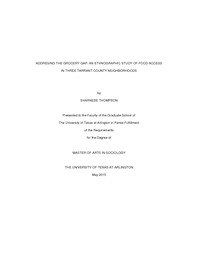| dc.contributor.author | Thompson, Sharnese | en_US |
| dc.date.accessioned | 2015-07-31T22:10:12Z | |
| dc.date.available | 2015-07-31T22:10:12Z | |
| dc.date.submitted | January 2015 | en_US |
| dc.identifier.other | DISS-13117 | en_US |
| dc.identifier.uri | http://hdl.handle.net/10106/25073 | |
| dc.description.abstract | This study examines the impact of food insecurity in three neighborhoods in Fort Worth, Texas. The neighborhoods in this study include, Southside, Stop Six, and Como. Food Deserts can be defined as poor urban areas that have little to no access to affordable and healthy food. My methodology in conducting this research was participant observation. Through notes, field observation, and informal interviews I was able to conclude the affects lack of affordable and healthy food had on these three areas. Additionally, I was able to determine if current methods to mitigate food deserts were effective. | en_US |
| dc.description.sponsorship | Agger, Ben | en_US |
| dc.language.iso | en | en_US |
| dc.publisher | Sociology | en_US |
| dc.title | Addressing The Grocery Gap: An Ethnographic Study Of Food Access In Three Tarrant County Neighborhoods | en_US |
| dc.type | M.A. | en_US |
| dc.contributor.committeeChair | Agger, Ben | en_US |
| dc.degree.department | Sociology | en_US |
| dc.degree.discipline | Sociology | en_US |
| dc.degree.grantor | University of Texas at Arlington | en_US |
| dc.degree.level | masters | en_US |
| dc.degree.name | M.A. | en_US |

